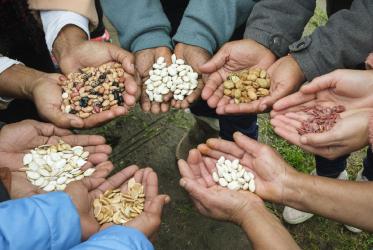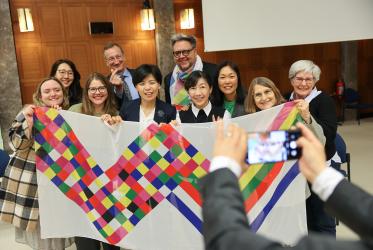But we have this treasure in clay jars, so that it may be made clear that this extraordinary power belongs to God and does not come from us. We are afflicted in every way, but not crushed; perplexed, but not driven to despair; persecuted, but not forsaken; struck down, but not destroyed; always carrying in the body the death of Jesus, so that the life of Jesus may also be made visible in our bodies.
(2 Cor.4: 7 – 10 NRSV)
I am Marjorie Lewis, immediate past President and the first woman to be appointed to the Presidency of the United Theological College of the West Indies (UTCWI) in Jamaica. I am currently on Sabbatical, based at the Atlantic School of Theology in Halifax Canada. Here I am conducting research on approaches to Ministerial Formation and Theological Education, with special focus on spiritual care within multi-faith and LGBTIQ communities.
I write as one of the Pan African women theologians in the Caribbean who is ‘troubled, but not destroyed,’ and share some ways in which Caribbean women theologians engage with the theme.
In 2003 I wrote a paper exploring some ideas on Womanist Theology in the Caribbean[i]. My perspective was that for Caribbean women, the point of departure for doing theology is the iconic figure of Nanny of the Maroons, National Heroine of Jamaica and representative of shared values among Jamaican (and Caribbean) women of different ethnic groups, religious and ideological persuasions. Nanny the Ancestral Mother and Icon seemed to me to embody life-giving, egalitarian and community-building values and actions which Caribbean women valued.
These values traveled with African women and men from West Africa, across the Atlantic Ocean, and were sustained, sung and survived the horrors of enslavement and colonization. Nanny, along with her brothers waged a successful guerrilla war against the colonizing British in the seventeenth century, culminating in a controversial peace treaty in 1740 which gave the Maroons freedom and internal self-government, while other Africans on the Plantations were still enslaved.
Nanny and her ‘daughters’ have had to face the complexities of agency in the struggle of a people for freedom and fullness of life. Like her biblical parallel, Deborah the Judge in the Hebrew Bible, Nanny faced then and her daughters face now, the challenges of fighting for the community with their heart, soul, mind and body, navigating the perils and possibilities of shared leadership with men and other women and the danger of internalizing the models of leadership that continue to alienate sections of the community.
While I have coined the term ‘Nannyish T’eology’ to describe this perspective, it is by no means the only perspective of Caribbean women theologians. In the true spirit of a region where the term ‘Caribbean’ includes not only the African majority population but intermingles with people of Asian , European and other ancestries, the dialogue continues in many spaces and using varied media.
Collaboration among Caribbean women theologians has included a Seminar-Workshop for women in ministry in the 1980s[ii], the establishment in 2010 of the group, Caribbean Women Theologians for Transformation[iii], and the publishing of a peer-reviewed book by Caribbean Women Theologians through the auspices of the World Communion of Reformed Churches (WCRC)[iv].
The work of the Caribbean women has included participation in traditional and innovative work in the Church and the wider society. Troubled but not destroyed, Caribbean women have exercised agency in wrestling with patriarchy within the Church and church institutions as well as exercising mission and ministry outside of the traditional structures of the Church.
Individually and collectively, Pan African Women in the Caribbean have been troubled by exclusion from all ministries in the Church and have been able to successfully advocate for access to the Ministry of Word and Sacrament to be available for women as well as men.
We have been troubled by patriarchy in the society and joined in the membership of the Jamaica Women’s Political Caucus to lobby for more women to be involved in representational politics. We have joined with local and United Nations organizations to develop strategies for the Church’s participation in the promotion of sexual and reproductive health, economic and environmental justice.
‘Troubled but not destroyed,’ Pan African Women in the Caribbean remain faithful to our calling to make the light of Jesus visible in and through our through our intentions, our intellect, the work of our hands and our bodies for the benefit of the Church, the Caribbean nations and the world.
A few examples of the work of Caribbean women theologians are: Baptist Minister Rev. Doreen Wynter who leads an inner-city congregation that has as a part of its ministry, a centre for pregnant teenage girls; Roman Catholic Lay Theologian and University of the West Indies Quality Assurance expert, Dr. Anna Perkins who has conducted research on Christian Ethics and popular culture; Anglican Deaconess Dr. Rachele Vernon who in 2004 pioneered training in HIV and AIDS counselling and advocacy for students at the United Theological College of the West Indies (UTCWI); Rev. Marvia Lawes, Baptist Minister, who is currently engaged in Public Theology through a radio discussion programme aired weekdays on Love 101 FM Radio and streamed live on the internet; Rev. Penelope Morgan-Owens – the first woman ordained by the Moravian Church in Jamaica who serves as a Chaplain to the Police Force.
Indeed, we are motivated by what troubles us and sustained by God. We affirm the black and beautiful ‘clay jars’ that we are and rejoice in the privilege to share in God’s mission to take light to the world.
[i] Marjorie Lewis, “Diaspora Dialogue: Womanist Theology in Engagement With Some Aspects of the Black British and Jamaican Experience,” in Anthony Reddie (Ed.) Black Theology an International Journal Volume 2 Number 1 January 2004 (London Equinox Publishing Ltd., 2003) pp. 85 - 109
[ii] Althea Spencer-Miller (Editor) “New Eyes for Seeing: women Ministers and their future”: the first Workshop-Seminar for Women Ministers in the Caribbean (Kingston: Gentle Printers, 1989)
[iii] The Mission Statement of CWTT states, “We are a platform from which Caribbean women of faith and belief can make critical contributions to the struggle for justice and right relationships within the Caribbean and globally. Informed by the traditions of Caribbean Christianity and of other Caribbean religions, we will support and participate in initiatives that reflect, record, advocate and act for justice for women in the Caribbean nations and territories and globally.”
[iv] Patricia Sheerattan-Bisnauth (Editor) Righting Her-Story: Caribbean Women Encounter the Bible Story (Geneva: World Communion of Reformed Churches, 2011)






